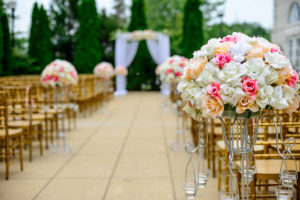What Would a Humanist Do? Defusing Wedding Drama
 Photo by Shardayyy Photography on Unsplash
Photo by Shardayyy Photography on Unsplash Today we introduce a new TheHumanist.com column, “What Would a Humanist Do?” Fans of Joan Reisman-Brill’s “Humanist Dilemma,” fear not: this isn’t a replacement of our popular long-running advice column but a new format that will allow multiple opinions on the same question. We may even see some back-and-forth from those dispensing advice (all of whom are AHA staffers). We hope you enjoy this new format and invite you to send questions to the WWHD gang at: wwhd@americanhumanist.org.
Q:
I’m about to officiate my sister’s wedding. Both the bride and groom are excited about having a nonreligious ceremony, and I’m excited to be able to do this for them. My dilemma is that the groom doesn’t want to tell his religious family that it’s a nonreligious ceremony beforehand. He kind of wants to shock them in the moment. I feel uncomfortable being part of the deception and the shock scheme, but I want to honor his request to keep the details quiet before the big day. I’m starting to get some innocent questions from his family about my religion; for example, they want to know my denomination and how I’ll be incorporating faith into the ceremony. Short of lying, what’s the best way to respond to these questions without “outing” my soon-to-be brother-in-law’s plans? And, while I realize this is his day, is there any point in trying to nudge him to ease his family into this or perhaps give them a heads up? I feel like dealing with this drama now is so much better than dealing with it while my sister is in a wedding dress, but this also isn’t my show.
—What Would a Humanist Do?
A’s:
EMILY NEWMAN, Education Coordinator. Weddings are a time to celebrate two families uniting and a new family forming. Knowing that plenty of things out of your (and the couple’s) control can go wrong (e.g. the weather, injury, illness), I think it’s important to mitigate avoidable drama or discomfort. First, what does the bride want to do? Does she want to shock her future in-laws too, or does she disagree with her groom? It is their day and both deserve to enjoy it. As for handling questions, I would focus on humanist values as a way to find common ground with the religious family members, and emphasize that you’ve prepared the ceremony based on the wishes of the couple. For example, you could say, “humanism affirms our ability and responsibility to lead ethical lives of personal fulfillment that aspire to the greater good of humanity” or that you will incorporate “faith in human goodness and compassion.” Or simply: “all of the reading and musical selections chosen are meaningful to the couple and we’ve worked together on creating a joyous ceremony that celebrates their love.” If that doesn’t satisfy them, then perhaps they shouldn’t attend.
PETER BJORK, Web Content Manager. It isn’t your job as a wedding officiant to blindly follow the orders of the groom (and, as Emily correctly asks: Where is the bride in all of this?). At this point in my life I can confidently say my second profession is that of “wedding attendee,” and the mistake I see over and over again is a couple thinking their wedding is about them. Weddings are just as much an event for the attending crowd as they are for the two people getting married. Your future brother-in-law has a responsibility to make sure all guests at his wedding are as comfortable as possible, and that includes his parents and everyone else witnessing the ceremony.
It certainly sounds to me like the groom has watched one too many wedding comedy/drama films, and thinks the shock and awe of a surprise secular ceremony will be a glorious sight to behold. Your instincts are correct: deal with this drama before the wedding day.
MEREDITH THOMPSON, Development Associate. How you approach this dilemma will depend on the nature of your relationship with your sister and your future brother-in-law. While many of the details of the wedding are out of your control, you can decide whether or not, as the officiant, to voice your concerns to the bride and groom. If you feel comfortable doing so, approach them before their wedding day to make sure you’re all on the same page. Open the door for questions and mention his family’s previous interactions with you and your reservations about shocking them. Depending on how that conversation is received, you can offer recommendations on how to have a humanist wedding while still honoring his family’s faith. But ultimately this is the marrying couple’s responsibility to address beforehand, not yours. At the end of the day, the focus of the wedding should be a celebration of the bride and groom’s love and commitment to each other, not a gotcha moment that is likely to upset family members.
If you’re looking to have a nonreligious wedding ceremony or have an interest in performing secular wedding ceremonies, consider humanist celebrancy. For information check out The Humanist Society.
And for humanist advice from multiple perspectives on all manner of situations, nuptial or otherwise, please send your question to wwhd@americanhumanist.org.
